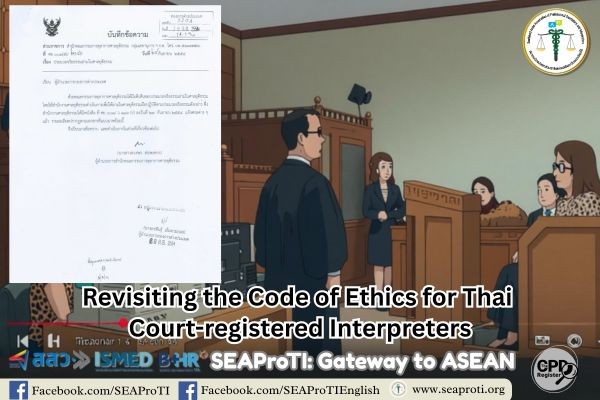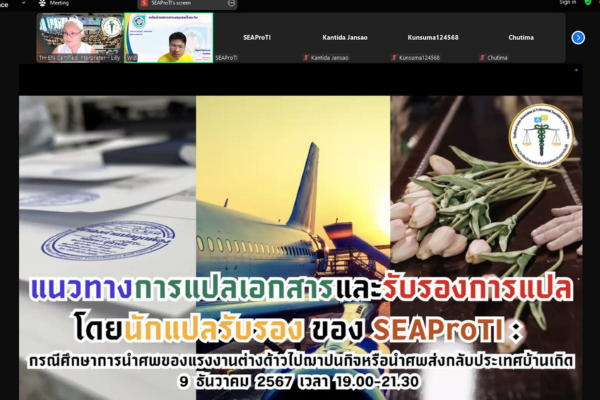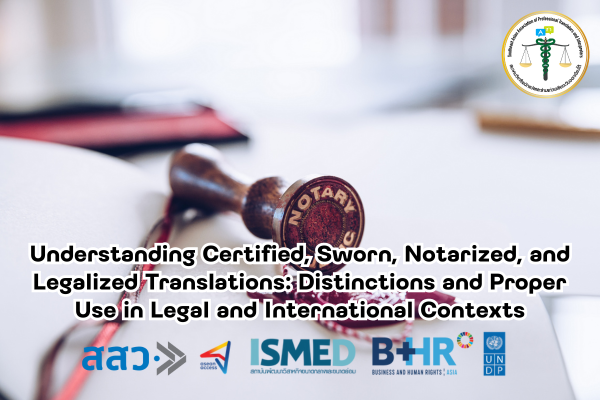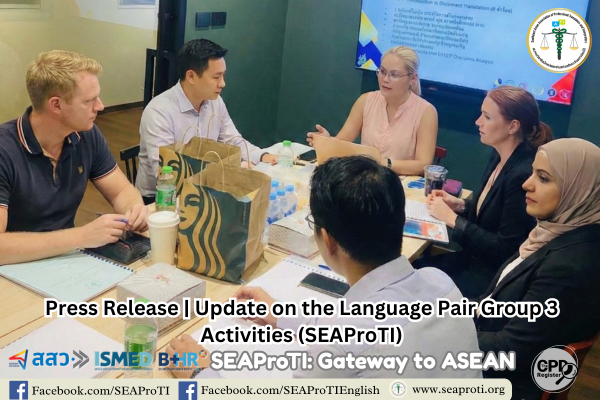Code of Ethics for Court Interpreters
Article 1
The primary duty of a court interpreter is to interpret Thai dialects, foreign languages, or sign languages, or to convey meaning through any other method. Interpreters must perform their duties with honesty, integrity, impartiality, and moral conduct consistent with the law and ethical standards. They shall maintain moral principles, possess a sound understanding of both languages, and be ready to serve the public interest. Interpreters must also demonstrate to the public that they perform their duties conscientiously and faithfully.
Commentary
An interpreter must act impartially in performing duties, taking no side and maintaining independence. They must also declare that they have no interest in the case in any form. If an interpreter has or may have a conflict of interest—such as being a friend, relative, or spouse of a party, or having previously worked on the case—they must immediately notify the court.
Interpreters must possess sufficient linguistic knowledge and skills, continually assess their competence, and inform the court of any limitations that might affect performance. They should avoid assignments that exceed their capabilities—for example, lack of familiarity with technical terms or difficulty understanding witnesses or defendants.
Article 2
During the performance of duties, interpreters must remain within the scope of interpretation. They shall not provide legal advice, express opinions, or engage in any conduct that could be considered beyond the interpreter’s role.
Commentary
The interpreter’s role is solely to facilitate communication. They must restrict their involvement to interpreting speech, documents, or signs, and should not initiate conversation with witnesses except to ensure the accuracy of interpretation.
Interpreters must render all interpretations accurately and completely, without alteration, omission, or addition. Sign language interpreters must use the full range of gestures, expressions, and body movements required for clarity, but must avoid behaviors that may confuse or influence the proceedings.
An interpreter may interpret legal advice given by a lawyer to a client only while the lawyer is actively providing that advice. They must never act or appear to act as a lawyer or legal consultant themselves.
Article 3
Interpreters must perform their duties with respect and decorum toward the court, following judicial procedures, rules, and protocols throughout the trial process.
Commentary
Interpreters should speak at a pace and volume audible throughout the courtroom and dress appropriately to show respect for the dignity of the court. They must avoid any conduct that may discredit the judiciary.
Under court regulations, any act that disrupts or disrespects court proceedings constitutes contempt of court. The court has authority to remove the person from the courtroom, impose imprisonment not exceeding six months, a fine not exceeding five hundred baht, or both.
Article 4
When ordered by the court, interpreters must present certificates of training or documents verifying their experience in interpretation, accurately and completely.
Commentary
The court may require interpreters to show proof of training or professional experience to ensure that they possess adequate knowledge, understanding, and qualifications to perform their duties properly.
Article 5
Interpreters must preserve the confidentiality of all information obtained in the course of performing their duties.
Commentary
Interpreters are required to maintain confidentiality regarding all facts learned in the course of duty. However, if such information involves a threat to life, imminent crime, or obstruction of justice, the interpreter must report it immediately to the court official in charge.
Interpreters must not discuss, report, or express opinions publicly concerning any case in which they have been involved, even if such information is not legally classified as confidential.
End of the Code of Ethics for Court Interpreters
Office of the Judiciary
(Officially promulgated and applicable throughout the Kingdom of Thailand)
About Certified Translators, Translation Certifiers, and Certified Interpreters of SEAProTI
The Southeast Asian Association of Professional Translators and Interpreters (SEAProTI) has formally announced the qualifications and requirements for registration of Certified Translators, Translation Certification Providers, and Certified Interpreters in Sections 9 and 10 of the Royal Gazette, published by the Secretariat of the Cabinet, Office of the Prime Minister of Thailand, on 25 July 2024 (Vol. 141, Part 66 Ng, p. 100). Certified Translators, Translation Certification Providers, and Certified Interpreters
The Council of State has proposed the enactment of a Royal Decree, granting registered translators and recognized translation certifiers from professional associations or accredited language institutions the authority to provide legally valid translation certification (Letter to SEAProTI dated April 28, 2025)
SEAProTI is the first professional association in Thailand and Southeast Asia to implement a comprehensive certification system for translators, certifiers, and interpreters.
Head Office: Baan Ratchakru Building, No. 33, Room 402, Soi Phahonyothin 5, Phahonyothin Road, Phaya Thai District, Bangkok 10400, Thailand
Email: hello@seaproti.com | Tel.: (+66) 2-114-3128 (Office hours: Mon–Fri, 09:00–17:00)
สรุปประมวลจริยธรรมล่ามในศาลยุติธรรม
ข้อ ๑
หน้าที่ที่สำคัญของล่ามในศาลยุติธรรมคือ แปลภาษาไทยท้องถิ่น ภาษาถิ่น ภาษาต่างประเทศ ภาษามือ หรือสื่อความหมายโดยวิธีอื่น โดยจักต้องปฏิบัติหน้าที่ด้วยความซื่อสัตย์ สุจริต เป็นกลาง ปราศจากอคติ ประพฤติตนตามกฎหมายและทำนองคลองธรรม อยู่ในกรอบศีลธรรมและจริยธรรม มีความรู้และความเข้าใจในภาษาที่แปลอย่างถ่องแท้และมีความพร้อมที่จะเสียสละเพื่อส่วนรวมเป็นสำคัญ ทั้งจักต้องแสดงให้เป็นที่ประจักษ์แก่สาธารณชนด้วยว่าตนปฏิบัติเช่นนี้อย่างเคร่งครัดครบถ้วน
คำอธิบาย
ล่ามต้องแสดงออกซึ่งความเป็นกลางในการปฏิบัติหน้าที่ ไม่เข้าข้างฝ่ายหนึ่งฝ่ายใด และจักต้องแสดงให้ปรากฏด้วยว่าตนไม่มีผลประโยชน์เกี่ยวข้องกับคดีนั้น ๆ ไม่ว่าในทางใดทางหนึ่ง หากล่ามมีส่วนได้เสียหรือผลประโยชน์ขัดกันในคดี ต้องแจ้งให้ศาลทราบโดยทันที เช่น ล่ามเป็นเพื่อน ญาติ หรือคู่สมรสของคู่ความ หรือเคยมีส่วนเกี่ยวข้องกับคดีมาก่อน หรือล่ามหรือญาติมีส่วนได้เสียทางการเงินกับคู่ความ เป็นต้น
ในด้านความรู้ความสามารถ ล่ามต้องศึกษาภาษา เตรียมความพร้อม และประเมินความสามารถของตนอยู่เสมอ หากมีข้อจำกัดต้องแจ้งเจ้าหน้าที่ทันที ล่ามควรหลีกเลี่ยงคดีที่เกินความสามารถ เช่น ขาดความคุ้นเคยกับศัพท์เฉพาะ หรือมีอุปสรรคในการเข้าใจพยานหรือจำเลย
ข้อ ๒
ในขณะปฏิบัติหน้าที่ ล่ามต้องปฏิบัติหน้าที่ให้อยู่ในขอบเขตของการแปล และไม่ให้คำแนะนำหรือแสดงความคิดเห็นแก่บุคคลที่ตนแปลให้ ทั้งต้องไม่กระทำการใด ๆ ที่ถือว่าเป็นการทำหน้าที่อื่นนอกจากการแปล
คำอธิบาย
หน้าที่ของล่ามคือการทำให้บุคคลอื่นสามารถสื่อสารกันได้เท่านั้น ล่ามจึงควรจำกัดบทบาทของตนไว้เฉพาะการแปล ไม่ควรเป็นฝ่ายเริ่มพูดคุยกับพยาน เว้นแต่เพื่อยืนยันความถูกต้องของการแปล ล่ามต้องแปลให้ถูกต้องและครบถ้วน ไม่เปลี่ยนแปลงหรือตัดทอนข้อความ และไม่อธิบายเพิ่มเติม ล่ามภาษามือต้องใช้ท่าทาง สีหน้า และภาษากายให้เหมาะสม แต่ต้องไม่แสดงกิริยาที่ก่อให้เกิดความสับสนหรือมีผลต่อการพิจารณาคดี ล่ามอาจถ่ายทอดคำแนะนำทางกฎหมายได้เฉพาะขณะทนายให้คำแนะนำนั้นอยู่เท่านั้น
ข้อ ๓
ล่ามต้องปฏิบัติหน้าที่ด้วยความเรียบร้อยและเคารพนับถือต่อศาล ทั้งควรทราบและปฏิบัติตามระเบียบ ขั้นตอน และกฎเกณฑ์ในการพิจารณาคดี
คำอธิบาย
ล่ามควรพูดด้วยอัตราความเร็วและระดับเสียงที่ได้ยินทั่วห้องพิจารณา แต่งกายสุภาพ เพื่อให้เกียรติศาลและรักษาความศักดิ์สิทธิ์ของกระบวนพิจารณา ล่ามไม่ควรกระทำสิ่งใดที่ก่อให้เกิดความเสื่อมเสียต่อศาล เช่น พูดคุยเสียงดัง หัวเราะ หรือแสดงกิริยาไม่เหมาะสม ศาลมีอำนาจรักษาความเรียบร้อยในบริเวณศาล หากล่ามประพฤติตนไม่เหมาะสม ศาลมีสิทธิสั่งลงโทษไล่ออกจากบริเวณศาล หรือจำคุกไม่เกินหกเดือน หรือปรับไม่เกินห้าร้อยบาท หรือทั้งจำทั้งปรับ
ข้อ ๔
กรณีที่ศาลมีคำสั่ง ล่ามต้องแสดงหนังสือรับรองการฝึกอบรมหรือประสบการณ์ที่เกี่ยวข้องกับการแปลอย่างถูกต้องและครบถ้วน
คำอธิบาย
ศาลอาจสั่งให้ล่ามแสดงหนังสือรับรองการฝึกอบรมหรือเอกสารที่ยืนยันประสบการณ์ด้านการแปล เพื่อให้มั่นใจว่าล่ามมีความรู้ ความเข้าใจ และมีคุณสมบัติเหมาะสมในการปฏิบัติหน้าที่ในศาล
ข้อ ๕
ล่ามต้องรักษาข้อมูลเกี่ยวกับคดีที่ตนปฏิบัติหน้าที่ไว้เป็นความลับ
คำอธิบาย
ล่ามต้องรักษาความลับในข้อเท็จจริงที่ได้ล่วงรู้จากการทำหน้าที่ เว้นแต่ข้อมูลนั้นเกี่ยวข้องกับอาชญากรรมที่อาจเกิดขึ้น หรือเป็นภัยต่อชีวิตผู้อื่น ล่ามจึงมีหน้าที่แจ้งข้อมูลต่อผู้รับผิดชอบราชการศาลโดยทันที ทั้งนี้ ล่ามต้องไม่สนทนา รายงาน หรือให้ความเห็นใด ๆ ต่อสาธารณะเกี่ยวกับคดีที่ตนเกี่ยวข้อง แม้ข้อมูลดังกล่าวจะไม่เข้าข่ายความลับตามกฎหมายก็ตาม
จบประมวลจริยธรรมล่ามในศาลยุติธรรม
สำนักงานศาลยุติธรรม
(ประกาศและใช้บังคับทั่วราชอาณาจักร)
เกี่ยวกับนักแปลรับรอง ผู้รับรองการแปล และล่ามรับรองของสมาคมวิชาชีพนักแปลและล่ามแห่งเอเชียตะวันออกเฉียงใต้
สมาคมวิชาชีพนักแปลและล่ามแห่งเอเชียตะวันออกเฉียงใต้ (SEAProTI) ได้ประกาศหลักเกณฑ์และคุณสมบัติผู้ที่ขึ้นทะเบียนเป็น “นักแปลรับรอง (Certified Translators) และผู้รับรองการแปล (Translation Certification Providers) และล่ามรับรอง (Certified Interpreters)” ของสมาคม หมวดที่ 9 และหมวดที่ 10 ในราชกิจจานุเบกษา ของสำนักเลขาธิการคณะรัฐมนตรี ในสำนักนายกรัฐมนตรี แห่งราชอาณาจักรไทย ลงวันที่ 25 ก.ค. 2567 เล่มที่ 141 ตอนที่ 66 ง หน้า 100 อ่านฉบับเต็มได้ที่: นักแปลรับรอง ผู้รับรองการแปล และล่ามรับรอง
สำนักคณะกรรมการกฤษฎีกาเสนอให้ตราเป็นพระราชกฤษฎีกา โดยกำหนดให้นักแปลที่ขึ้นทะเบียน รวมถึงผู้รับรองการแปลจากสมาคมวิชาชีพหรือสถาบันสอนภาษาที่มีการอบรมและขึ้นทะเบียน สามารถรับรองคำแปลได้ (จดหมายถึงสมาคม SEAProTI ลงวันที่ 28 เม.ย. 2568)
สมาคมวิชาชีพนักแปลและล่ามแห่งเอเชียตะวันออกเฉียงใต้ เป็นสมาคมวิชาชีพแห่งแรกในประเทศไทยและภูมิภาคเอเชียตะวันออกเฉียงใต้ที่มีระบบรับรองนักแปลรับรอง ผู้รับรองการแปล และล่ามรับรอง
สำนักงานใหญ่: อาคารบ้านราชครู เลขที่ 33 ห้อง 402 ซอยพหลโยธิน 5 ถนนพหลโยธิน แขวงพญาไท เขตพญาไท กรุงเทพมหานคร 10400 ประเทศไทย
อีเมล: hello@seaproti.com โทรศัพท์: (+66) 2-114-3128 (เวลาทำการ: วันจันทร์–วันศุกร์ เวลา 09.00–17.00 น.)

























